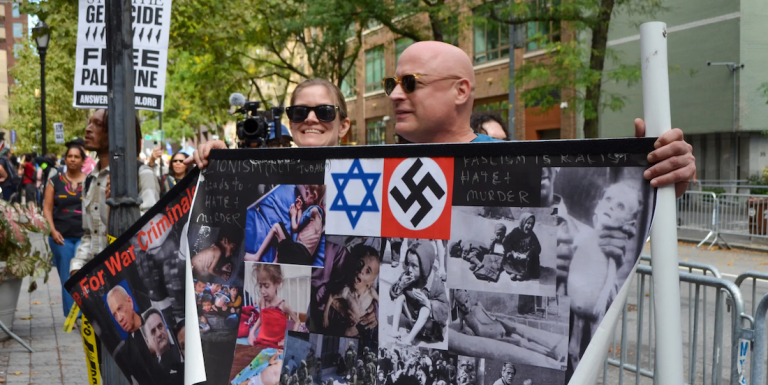
Thousands March Demanding Accountability, U.S. Aid Suspension Amid U.N. General Assembly

New York, N.Y. — Thousands converged on the streets of New York City on Friday, as Israeli Prime Minister Benjamin Netanyahu’s appearance at the United Nations General Assembly ignited one of the city’s largest protests against Israel’s actions in Gaza since the outbreak of war nearly two years ago.
—————
The demonstration, marked by calls for Netanyahu’s arrest on war crimes charges and an immediate halt to U.S. support for Israel, swelled to nearly 2,000 people according to police estimates, with substantial blocks of Midtown Manhattan brought to a standstill amid chants for justice and escalating international scrutiny of Israel’s government.
Protesters Call for Arrest, End to U.S. Support
Protesters assembled early in Times Square, waving Palestinian flags and carrying hand-painted signs denouncing the humanitarian catastrophe in Gaza.

As the day progressed, the crowd surged east toward the U.N. headquarters, occupying major arteries like 42nd Street and chanting, “Netanyahu you can’t hide, we charge you with genocide,” and “Stop starving Gaza now!”
Organizers reported genuine alarm among the city’s residents about ongoing Israeli military operations, the restricting of critical aid, and the suffering of children in the besieged territory.
Participants ranged widely in age and background; many expressed deep disappointment that Netanyahu had not been brought before The Hague amid International Criminal Court proceedings.
Inside the U.N. Assembly, the impact of the protests was immediately apparent. As Netanyahu began his speech, dozens of national delegations staged a public walkout, leaving large sections of the auditorium empty and drawing cheers from demonstrators outside.
Many held up new banners, linking the lack of accountability for alleged war crimes directly to continued U.S. military aid, which has topped US$3.3 billion (roughly 3.09 billion euros) per year since the war began.
Voices From the Protest: International and Local Response

On the sidelines, a group of New Yorkers formed an ad hoc Hague Group, pressing for concrete actions such as targeted sanctions against Israel.
Al-Sharif Nassef, speaking for the Palestine Movement – NYC, underlined that “demonstrations play a crucial role in creating political momentum for real change.”
Others reflected outrage at being unable to force legal accountability through local or federal law enforcement, given the U.S.’s non-signatory status to the ICC treaty that would allow arrest warrants against foreign leaders to be executed on U.S. soil.
Many expressed concern that the city’s mayor had welcomed Netanyahu, even as local mayoral candidate Zohran Mamdani used the moment to call for enforcement of international law and support for Palestinian rights.
Counterprotesters supporting Israel were present but contained by NYPD officers, ensuring only limited interaction between opposing groups.
“Witnessing this unfold shatters my heart. I don’t understand why everyone isn’t here,” said David Robinson, 64, a Brooklyn resident, voicing a sentiment echoed by many at the demonstration.
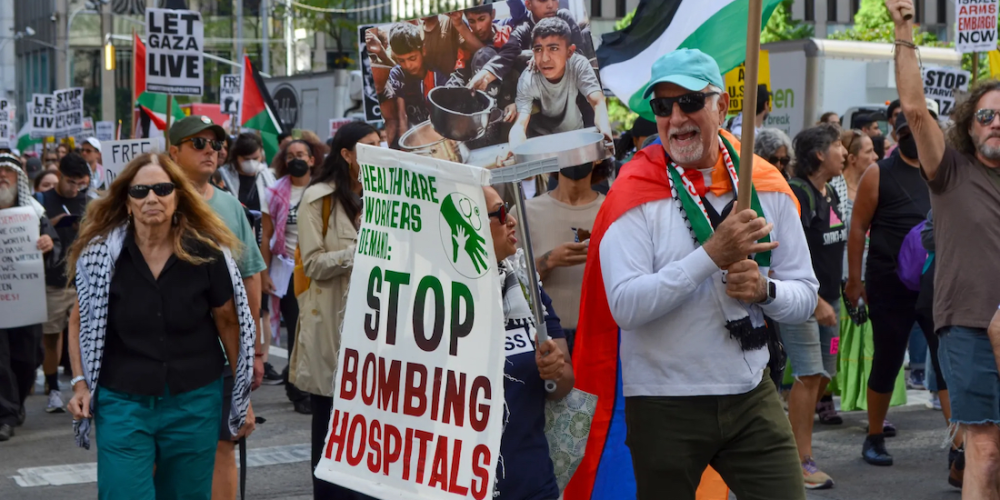
International Context: U.N. Diplomacy and Walkout
Netanyahu’s speech at the UN was widely viewed as a flashpoint for both international diplomacy and political theater. Offering a map he called “The Curse,” Netanyahu condemned Western nations’ recent recognition of Palestinian statehood, accusing them of encouraging terrorism.
His refusal to accept U.N. calls for a ceasefire or unimpeded humanitarian access has intensified criticism, especially after an ICC arrest warrant was issued last year for alleged crimes against humanity in Gaza — charges Israel denies.
Delegates from Australia, Canada, France, Ireland, and others left the General Assembly as Netanyahu spoke, while official US representatives remained but were noticeably limited to lower-level diplomats. Outside, the protest in Manhattan amplified demands for accountability, reflecting a global outcry against the humanitarian effects of the Israeli military campaign.
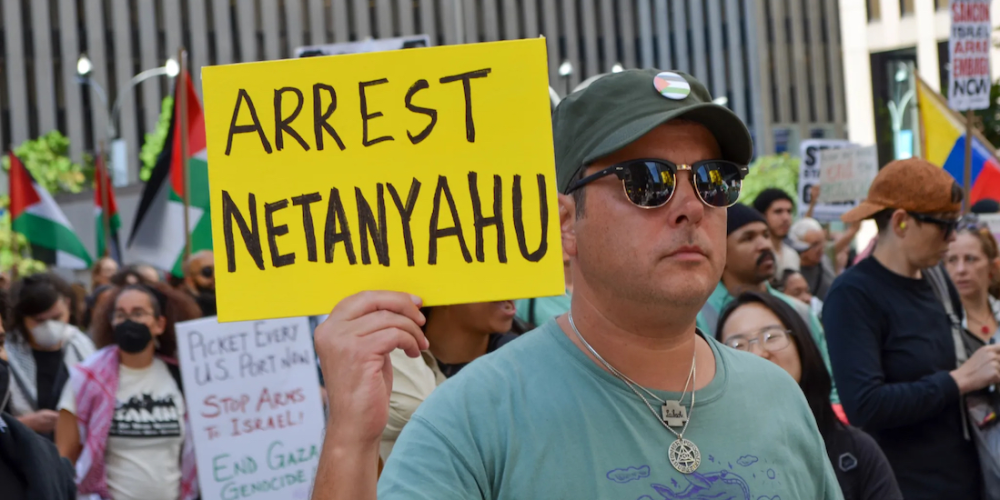
Humanitarian Impact and Local Sentiment
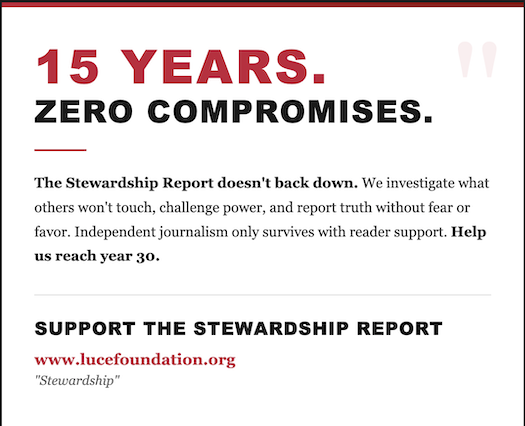
Speakers at the rally included New Yorkers whose families remain under siege in the West Bank and Gaza. Meagan Fredette held a sign reading “Is baby formula Hamas???” as she recounted loss of access to food and medical supplies, tying Israeli restrictions to reports of severe famine as confirmed by U.N. monitors.
Additional demonstrators highlighted multiethnic solidarity, displaying flags from Colombia and Ireland, countries that have backed Palestinian rights.
Protest organizers argued that ongoing American assistance must be reevaluated in light of famine conditions, widespread displacement, and mounting death tolls estimated in the tens of thousands.
Pro-Palestinian candidates used the platform to press for a complete arms embargo, while city officials remained cautious in statements, balancing condemnation of civilian suffering with calls for the release of Israeli hostages held by Hamas.
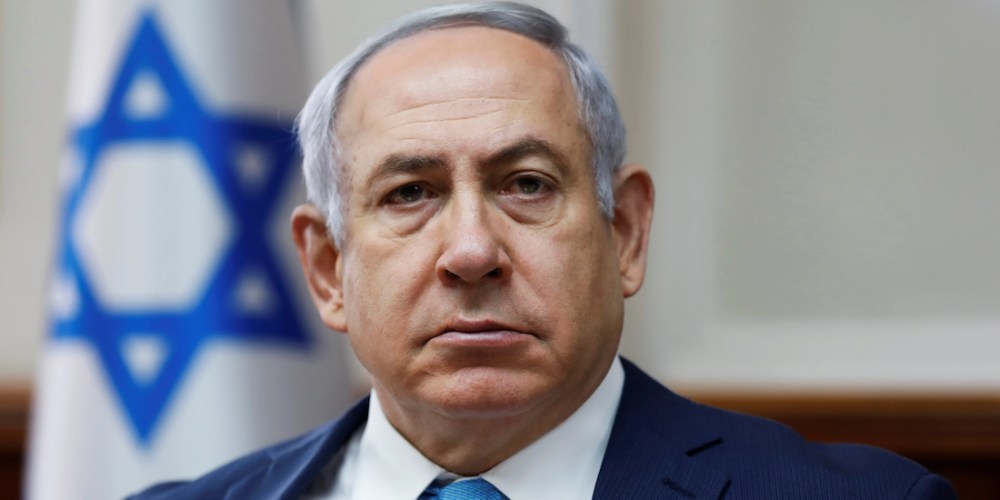
Netanyahu U.N. Visit Sparks NYC Protests Over Gaza Genocide (Sept. 26, 2025)
Summary for Audio File
Thousands protested in Midtown Manhattan during Israeli Prime Minister Benjamin Netanyahu’s U.N. General Assembly speech, demanding his arrest for alleged war crimes and suspension of U.S. aid to Israel amid Gaza’s humanitarian crisis. Delegates walked out of the UN session in solidarity, amplifying calls for international accountability and an immediate end to military operations that have led to tens of thousands of casualties and severe famine in Gaza, while local leaders and activists pressed for sanctions and a reassessment of foreign policy.
#NetanyahuUNProtest #NYCProtests #EndAidToIsrael #GazaCrisis #AccountabilityNow #HumanghtsNYC
TAGS: netanyahu, gaza crisis, new york city, united nations, war crimes, protests, palestine, international law,
US aid, hostages, famine, genocide, times square, hague,mayoral election, zohran mamdani, eric adams,
ICC, sanctions, israeli delegation, walkout, humanitarian crisis, foreign policy, arms embargo, activism
